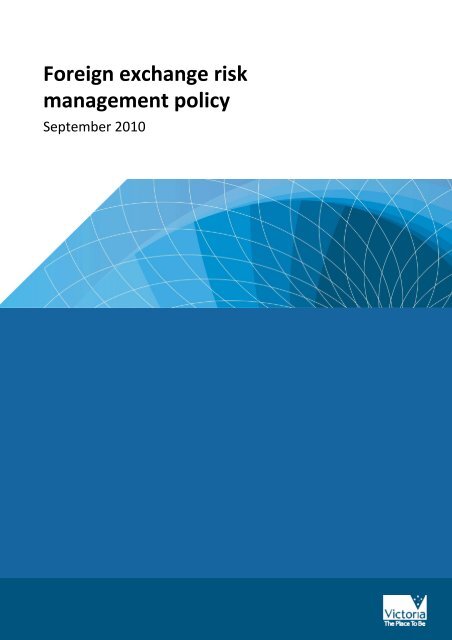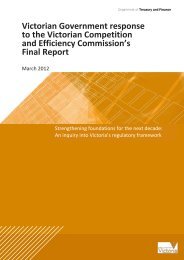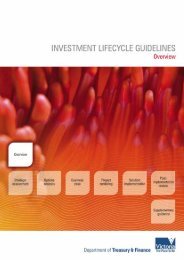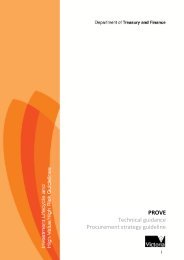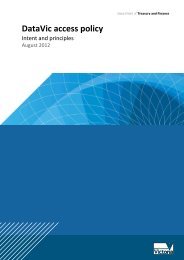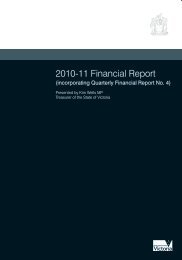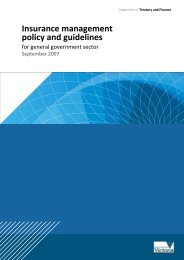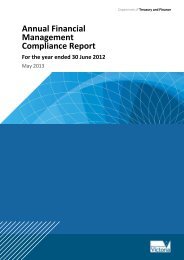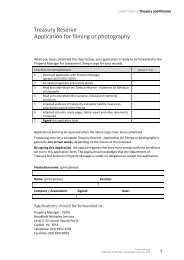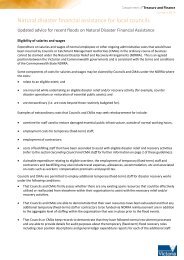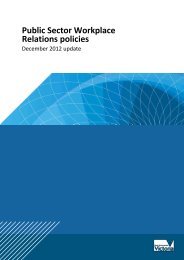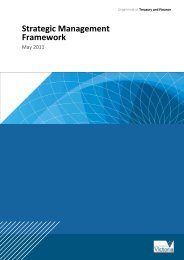Foreign exchange risk management policy - Department of Treasury ...
Foreign exchange risk management policy - Department of Treasury ...
Foreign exchange risk management policy - Department of Treasury ...
You also want an ePaper? Increase the reach of your titles
YUMPU automatically turns print PDFs into web optimized ePapers that Google loves.
<strong>Foreign</strong> <strong>exchange</strong> <strong>risk</strong><br />
<strong>management</strong> <strong>policy</strong><br />
September 2010<br />
<strong>Foreign</strong> <strong>exchange</strong> <strong>risk</strong><br />
<strong>management</strong> <strong>policy</strong><br />
1
Background<br />
Policy<br />
The objectives <strong>of</strong> this <strong>policy</strong> are to ensure that foreign <strong>exchange</strong> <strong>risk</strong>s are effectively identified, assessed,<br />
monitored and managed by departments and agencies, and that the strategies adopted by departments or<br />
public sector agencies are consistent with the overall objectives <strong>of</strong> the Government.<br />
The State has a conservative approach to the <strong>management</strong> <strong>of</strong> foreign <strong>exchange</strong> <strong>risk</strong>s and accordingly,<br />
departments and public sector agencies are encouraged to develop specific measures that best address the<br />
foreign <strong>exchange</strong> <strong>risk</strong> <strong>of</strong> their business.<br />
<strong>Foreign</strong> <strong>exchange</strong> <strong>risk</strong> is the <strong>risk</strong> that the rate <strong>of</strong> <strong>exchange</strong> used to convert foreign currency payments and<br />
receipts or assets and liabilities to Australian dollars will move in a direction that causes an adverse impact<br />
on the State’s budget outcome.<br />
<strong>Foreign</strong> <strong>exchange</strong> <strong>risk</strong> may arise from a contractual obligation entered into by a public sector agency to<br />
obtain or supply goods and services or to undertake borrowings or investments in a foreign currency. An<br />
example is the purchase <strong>of</strong> equipment with payment denominated in a foreign currency.<br />
<strong>Foreign</strong> <strong>exchange</strong> <strong>risk</strong> should be measured on a net basis after taking into account any <strong>of</strong>fsetting or natural<br />
currency exposures.<br />
A public body that has a foreign currency exposure that is in aggregate AUD1,000,000 or more and is known<br />
with certainty (with respect to the timing and quantum) must fully hedge the exposure. Except with the<br />
prior written approval <strong>of</strong> the Treasurer, a hedging transaction in excess <strong>of</strong> AUD1,000,000 must be with<br />
<strong>Treasury</strong> Corporation <strong>of</strong> Victoria (TCV). A public body should also hedge any exposure below AUD1,000,000<br />
where it is considered material, and known with certainty.<br />
A material exposure is something that can adversely affect the budget outcome due to foreign <strong>exchange</strong><br />
movements. ’Known with certainty‘ means that public sector agencies need to be certain about the timing<br />
and amount <strong>of</strong> the foreign currency payable/receivable before the exposure is covered. Hedging will<br />
eliminate the <strong>risk</strong> <strong>of</strong> an adverse budget outcome and achieve certainty.<br />
Immaterial foreign currency exposures such as minor travel costs, will generally not need to be fully hedged<br />
unless deemed to be material in nature. Similarly foreign currency exposures that arise as part <strong>of</strong> an<br />
approved long term investment strategy where the currency exposure is being managed as part <strong>of</strong> the total<br />
investment portfolio <strong>risk</strong>, will also generally not need to be hedged.<br />
All hedging transactions in excess <strong>of</strong> AUD1,000,000 should be undertaken with TCV in accordance with the<br />
Government’s centralisation <strong>policy</strong>. Public bodies can undertake hedging transactions with their primary<br />
banking institution where the aggregated exposure is below AUD1,000,000. However, in such instances<br />
they must benchmark any quoted rate against relevant market rates as published in the Australian Financial<br />
Review or a similar reputable source. Also, TCV can advise and consult with departments and public sector<br />
agencies in relation to foreign currency hedging strategies.<br />
Instruments that may be approved for hedging FX exposures are spot and forward foreign <strong>exchange</strong><br />
contracts and forward foreign <strong>exchange</strong> option contracts.<br />
<strong>Foreign</strong> <strong>exchange</strong> <strong>risk</strong><br />
<strong>management</strong> <strong>policy</strong><br />
2
Operational Guidance<br />
<strong>Foreign</strong> <strong>exchange</strong> <strong>risk</strong>s are quantified by identifying all currently held assets and liabilities denominated in<br />
foreign currency and identifying contractually committed future currency transactions. The foreign<br />
<strong>exchange</strong> exposure will exist until settlement or until the <strong>exchange</strong> rate is fixed. The foreign <strong>exchange</strong><br />
exposure is determined by aggregating these balances by currency and settlement date and converting to<br />
Australian dollars at current <strong>exchange</strong> rates.<br />
Hedging transactions may only be closed <strong>of</strong>f if a change in foreign currency receipts and payments occurs<br />
and retaining the transaction results in an increase in exposure levels.<br />
Any funding bids that contain currency exposure should address the proposed currency hedging strategy.<br />
Bids should price future foreign currency denominated payments at the relevant forward rate which can be<br />
obtained from TCV. The preferred instrument for hedging identified foreign currency <strong>risk</strong>s identified in<br />
funding bids is a forward foreign <strong>exchange</strong> contract. An option strategy may be considered in exceptional<br />
circumstances, however will need to be supported by a justifiable business case. In addition, the option<br />
premium costs will need to be included in the funding bid.<br />
Performance Measurement<br />
Performance is measured by the degree to which an agency has reduced its foreign <strong>exchange</strong> exposure.<br />
Further Inquiries<br />
If you would like further information about Victoria’s <strong>Foreign</strong> Exchange Risk Management Policy please<br />
contact, James Dennis, Senior Analyst, Financial Risk Management, <strong>Department</strong> <strong>of</strong> <strong>Treasury</strong> and Finance, on<br />
(03) 9651 2313.<br />
<strong>Foreign</strong> <strong>exchange</strong> <strong>risk</strong><br />
<strong>management</strong> <strong>policy</strong><br />
3


